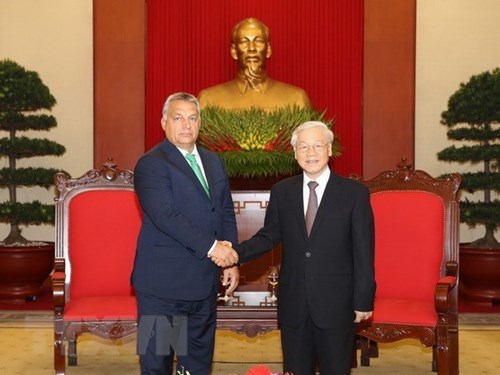The visit holds historical significance as it is the first trip by Vietnamese Party leader to a country in Central Eastern Europe since institutional transformation in the region.
    |
 |
|
General Secretary of the Communist Party of Vietnam (CPV)’s Central Committee Nguyen Phu Trong (right) received Hungarian Prime Minister Viktor Orban during the later's visit to Vietnam in September 2017 |
It aims to create a new landmark and momentum for the bilateral relationship, while enhancing mutual trust and understanding between leaders and peoples of the two countries.
The visit is also expected to deepen the traditional friendship and multi-faceted cooperation between Vietnam and Hungary, and advance their cooperation framework to a comprehensive partnership in order to make new and more practical changes in bilateral collaboration across various fields and promote Vietnam’s influence in Central Eastern Europe.
Through the Party leader’s trip, Vietnam wants to affirm its policy of considering Hungary an important and traditional partner in the region and enhance the bilateral relations in the areas of both sides’ potential and strength.
Vietnam and Hungary established diplomatic ties on February 3, 1950. Over the past years, active progress has been made in the bilateral relations, with high political trust and regular exchange of delegations, especially at the high levels, through Party, Government, National Assembly and local channels.
Between 2014 and 2017, Vietnam welcomed Hungary’s President, National Assembly Speaker and Prime Minister. Meanwhile, Vietnamese President, National Assembly Chairperson and Prime Minister also visited Hungary during the period.
The two sides have effectively cooperated with each other at multilateral forums, especially the United Nations (UN) and within the Asia-Europe Economic Meeting.
The Hungarian Government has committed to backing Vietnam’s bid to run for a seat at the UN Security Council for the 2020-2021 tenure. The country has also proposed Mekong-Danube cooperation, effective water resources collaboration, sub-regional connectivity and environmental protection.
With seven meetings, the Vietnam-Hungary Joint Committee on Economic Cooperation has carried forward its role in forging the bilateral cooperation.
The two countries have signed many agreements and documents, creating legal frameworks for their affiliation across fields.
Hungary has considered Vietnam the most important partner in Southeast Asia. Over the past years, their economic and trade ties have increased sharply, with two-way trade exceeding 355 million USD for the first time in 2017.
As of April 2018, Hungary had 17 valid projects in Vietnam with total registered capital of 63.56 million USD, ranking 57th out of 126 countries and territories investing in the country.
Besides, the two countries have made strides in cooperation on law-making, justice, national defence-security, health care, education-training and partnership between localities.
Education is a traditional cooperation sphere and a spotlight of the bilateral ties in the new period. Over the past years, Hungary is the only country in Eastern Europe to constantly increase scholarships for Vietnam.
Regarding cooperation between localities, Hanoi’s Tay Ho district has set up twinning relationship with 16 districts of Hungary’s Budapest. Besides, Hoi An city of central Quang Nam province and the Mekong Delta city of Can Tho have also established ties with Szentendre and Kaposvar cities of Hungary.
Source: VNA